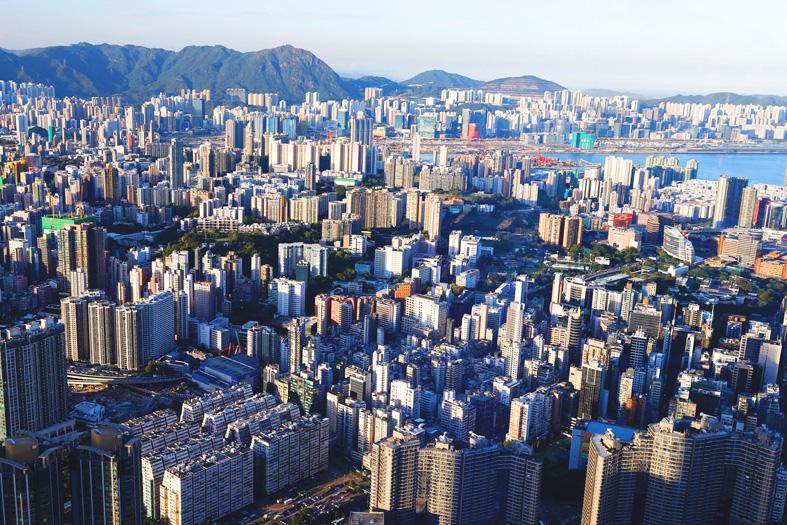Many professional workers from Hong Kong and Macau are to be able to apply for permanent residence starting on May 1, after new criteria received Cabinet approval, an official said.
Under the new regulations, professionals from the territories who have resided in Taiwan for at least five years with a work visa, and earned at least double the minimum wage in the past year, can apply for permanent residency as of next month, an official said ahead of an expected formal announcement next month.
The applicant must also have been present in Taiwan for at least 183 days in each of the five years.

Photo: Tyrone Siu , Reuters
Not all people engaged in professional work from the territories are currently able to obtain permanent residency in Taiwan under the Regulations Governing Residency or Permanent Residency for People of the Hong Kong Area and the Macau Area (香港澳門居民進入臺灣地區及居留定居許可辦法).
The amendment was drafted to comply with changes to the Act for the Recruitment and Employment of Foreign Professionals (外國專業人才延攬及僱用法), promulgated in July last year, which specifies that professionals from Hong Kong and Macau should be included.
A “professional” is defined as someone who has been issued a work permit or employment gold card by the Ministry of Labor or other authority.
It also includes “specialized or technical” positions such as civil engineers, financial and real-estate brokers, and veterinarians.
The changes would also allow professionals and their households to apply for two six-month-long “jobseeking” residency extensions, the official said.
Under the current law, professionals from the territories are required to leave the country when their contracts end.
Those who obtain a master’s or doctorate degree in Taiwan could have their waiting time reduced by one and two years respectively, the same as allowed under the new criteria of the foreign talent act, the official said.
Regarding concerns that the changes could reduce opportunities for local talent or create a loophole for Chinese infiltration, the official said that the rules require a five-year observation period, while a national security review mechanism would be implemented.

Taiwan has received more than US$70 million in royalties as of the end of last year from developing the F-16V jet as countries worldwide purchase or upgrade to this popular model, government and military officials said on Saturday. Taiwan funded the development of the F-16V jet and ended up the sole investor as other countries withdrew from the program. Now the F-16V is increasingly popular and countries must pay Taiwan a percentage in royalties when they purchase new F-16V aircraft or upgrade older F-16 models. The next five years are expected to be the peak for these royalties, with Taiwan potentially earning

STAY IN YOUR LANE: As the US and Israel attack Iran, the ministry has warned China not to overstep by including Taiwanese citizens in its evacuation orders The Ministry of Foreign Affairs (MOFA) yesterday rebuked a statement by China’s embassy in Israel that it would evacuate Taiwanese holders of Chinese travel documents from Israel amid the latter’s escalating conflict with Iran. Tensions have risen across the Middle East in the wake of US and Israeli airstrikes on Iran beginning Saturday. China subsequently issued an evacuation notice for its citizens. In a news release, the Chinese embassy in Israel said holders of “Taiwan compatriot permits (台胞證)” issued to Taiwanese nationals by Chinese authorities for travel to China — could register for evacuation to Egypt. In Taipei, the ministry yesterday said Taiwan

POSITIVE DEVELOPMENT: Japan and the US are expected to hold in-depth discussions on Taiwan-related issues during the meeting next month, Japanese sources said The holding of a Japan-US leaders’ meeting ahead of US President Donald Trump’s visit to China is positive news for Taiwan, former Japan-Taiwan Exchange Association representative Hiroyasu Izumi said yesterday. After the Liberal Democratic Party’s landslide victory in Japan’s House of Representatives election, Japanese Prime Minister Sanae Takaichi is scheduled to visit the US next month, where she is to meet with Trump ahead of the US president’s planned visit to China from March 31 to April 2 for a meeting with Chinese President Xi Jinping (習近平). Japan and the US are expected to hold in-depth discussions on Taiwan-related issues during the

‘LIKE-MINDED PARTNER’: Tako van Popta said it would be inappropriate to delay signing the deal with Taiwan because of China, adding he would promote the issue Canadian senators have stressed Taiwan’s importance for international trade and expressed enthusiasm for ensuring the Taiwan-Canada trade cooperation framework agreement is implemented this year. Representative to Canada Harry Tseng (曾厚仁) in an interview with the Central News Agency (CNA) said he was increasingly uneasy about Ottawa’s delays in signing the agreement, especially as Ottawa has warmed toward Beijing. There are “no negotiations left. Not only [is it] initialed, we have three versions of the text ready: English, French and Mandarin,” Tseng said. “That tells you how close we are to the final signature.” Tseng said that he hoped Canadian Prime Minister Mark Carney